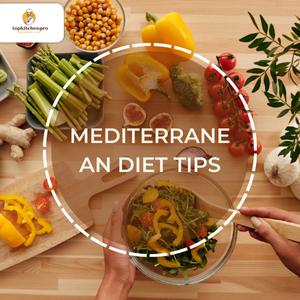Mediterranean Diet Tips: Simple Guide to a Healthier Lifestyle
Beginning a path towards better health can sometimes be daunting with numerous diets that vow amazing outcomes. Yet one type of eating habit reliably shines for its established benefits and food in moderation philosophy: the Mediterranean diet. Founded on the historic eating styles of nations bordering the Mediterranean Sea this is not so much a limiting diet but a healthy way of living. It prioritizes whole nutrient rich foods pleasurable eating and dining together. If you are seeking to increase your wellbeing enhance your energy and promote long term health this method of eating presents a tasty route ahead.
This handbook is meant to give you useful and functional tips to help you incorporate the principles of this diet into your everyday lifestyle in a smooth and hassle free manner. We will look at core tips that ensure you’re not only focused on what you’re eating but also on how you shop for it cook it and even socialize while eating.
Imperfection is not an aim here but rather progression towards a habit of eating that feeds both body and soul. Let’s explore the key elements that make this strategy so strong and popular with health professionals globally.

Focus on Fruits and Vegetables: A Foundational Tip
A foundational tip for embracing the Mediterranean diet is to bring fruits and vegetables to the center of each meal. Try to cover at least half of your plate with a colorful selection of these plant based superfoods. The philosophy is to enjoy the widest range of colors during the day since each color contains varying vitamins minerals and antioxidants. No complicated recipes are required sometimes the plainest preparations are the best.
Snack on a fresh apple sprinkle some spinach in your morning eggs or roast a mixture of bell peppers zucchini and eggplant for a tasty side dish. The secret is abundance and variety selecting what is fresh and seasonally available for optimal flavor and nutritional content.
This process automatically raises your fiber consumption supports a healthy gut and offers long lasting energy. Keep in mind that each meal is a chance to add more plants bringing them from the side dish to center stage.
Select Healthy Fats as Your Main Source of Fat
One of the key secrets to excelling at this way of life is to rethink your fat relationship. Rather than shunning fat the Mediterranean diet urges you to select the right types. The main fat source is extra virgin olive oil a real superstar that’s famous for its heart smart monounsaturated fats as well as antioxidants. Use it abundantly for cooking in salad dressing and even as a dip for wholegrain bread.
Other great sources of healthy fats are avocados nuts such as almonds and walnuts and seeds like flaxseeds and chia seeds. Fats are not the bad guys they help you absorb vitamins maintain a healthy brain and feel full after eating.
The key tip here is to substitute unhealthy saturated and Trans fats in processed food with these healthful alternatives establishing a basis for improved cardiovascular wellbeing and overall health.

Add Whole Grains for Enduring Energy
Another key tip is to replace refined grains with their wholegrain versions. Unlike white pasta and bread made from refined flour whole grains still have all components of the grain kernel the bran germ and endosperm. That is to say they are full of fiber protein and all sorts of nutrients removed in the refining process.
Adding whole grains such as farrow quinoa brown rice barley and whole wheat pasta gives your body slow burning carbohydrates. This results in steady energy levels maintains blood sugar regulation and keeps you satisfied for longer.
An easy tip is to begin with one switch at a time maybe selecting oatmeal for breakfast or a wholegrain bread for your sandwiches. Oats provide a nutty flavor and hearty texture that will bring variety and rich nourishment to your meals.
Choose Lean Proteins Such as Fish and Legumes
One life changing tip for your protein options is to lean into plant based and seafood sources. The Mediterranean diet places emphasis on fish and seafood which are high in omega three fatty acids suggesting at least weekly intake. Salmon mackerel sardines and tuna are great options. For other dishes the emphasis is on legumes beans lentils and chickpeas.
These are phenomenal protein and fiber sources and are extremely versatile great for soups stews and salads. Poultry eggs and cheese are consumed in moderate servings with red meat and processed meats being reserved for special occasions.
This switch in protein sources is a strong suggestion for heart health support weight management and inflammation reduction. It is about structuring meals around these leaner proteins for a nutritious and health supportive plate.

Have Dairy in Moderation Ideally Fermented
A useful tip for working with dairy on the Mediterranean diet is to approach it as a flavor accent not a central element. Dairy is used sparingly with a bias toward fermented forms like Greek yogurt and old cheeses like feta and Parmesan. These fermented forms usually have probiotics which are good for digestive health.
Rather than consuming large glasses of milk the Mediterranean style is to incorporate yogurt as a breakfast component with fruit and honey or to add a small amount of flavorful cheese on top of a salad or pasta dish to give it flavor.
This hack permits you to indulge in the creamy tangy flavors of dairy without eating out of control and instead concentrated on top quality options that contain extra health benefits.
Enjoy Your Meals and Share Them with Others
Arguably the most gorgeous and simplest tip is to alter not only what you eat but the way you eat. The Mediterranean lifestyle puts tremendous importance on the act of eating. What this entails is to slow down enjoy each bite and notice flavors and textures. It involves making time for meals with others making eating a social occasion with conversation and bonding.
Mindful eating is an important tip because it increases satisfaction prevents overeating since your body gets to recognize the fullness signals and decreases stress. This well rounded tip reminds us that eating is not just about fuel it’s about pleasure culture and community which is the essence of the authentic Mediterranean way of living.
Conclusion
Embracing the Mediterranean diet is an adventure into a more colorful and health oriented lifestyle and the easy tips that follow in this guide are intended to make it enjoyable as well as sustainable. Keep in mind that the central philosophy isn’t about deprivation or calorie counting but about inviting whole delicious foods and a balance of eating into your life.
The most crucial suggestions remind you to fill your plate with color opt for healthy fats and enjoy the process of preparation and sharing of foods. This is not a competition it is about adding one good change at a time giving these new habits a place naturally in your regular routine.
The rewards of implementing these suggestions reach far beyond weight control providing deep support for your heart brain and overall longevity. By prioritizing these foundational tips you’re making a wise investment in a lifetime relationship with food that is not only healthy but also profoundly satisfying. Begin with one or two of the tips that speak to you and build from there crafting a customized path to wellness that you can follow for a lifetime.
